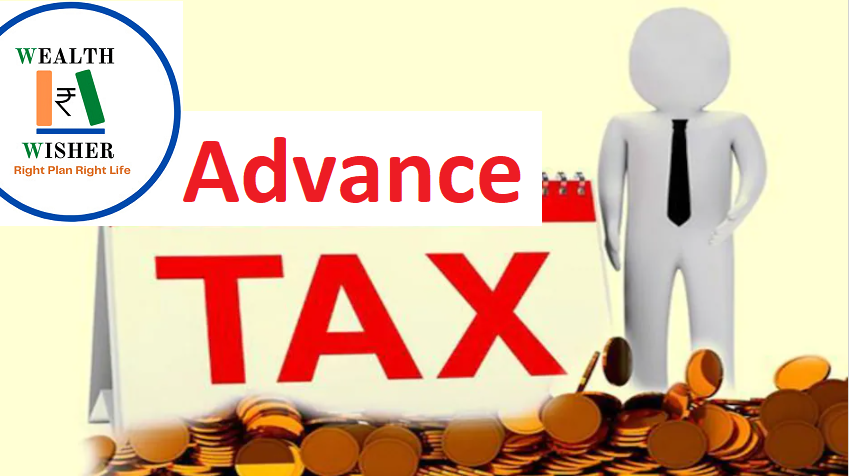As the term suggests, advance tax means paying taxes in advance. In India, if you are expecting that your income will result in paying tax to the government, it needs to be deposited periodically. This is done according to a set schedule before the financial year ends.
What is the logic of charging Advance Tax?
Simple – Government has expenses year-round. You too have income in between a financial year. It is better to pay during the year as it is convenient for both – payer & tax receiver
What is Advance Tax?
The advance income tax is currently paid every quarter.
This helps the government to receive tax revenue on an ongoing basis. Advance tax facilitates the government in receiving tax income every quarter rather than at the end of the financial year.
As a taxpayer also, you can make smaller payments every quarter. This is easy for you to calculate and pay.
It saves you from lump-sum tax payment at the end of the Financial Year – in March.
So, advance tax is merely the payment of tax liability by a taxpaying individual before the financial year closes.
To understand advance tax for individuals, it is important to know how and when you need to pay the tax and other essential factors. We will tell you that today.
Who is Eligible to Pay Advance Tax?
If:
- A taxpayer who receives taxable income from sources that are not subject to withholding tax, or where taxes are deducted at a lower rate must pay tax in advance. AND
- Whose estimated tax liability for the Financial Year surpasses ₹10,000, or more, as per Section 208 of the Income-tax Act, 1961.
If these 2 conditions meet, the IT department has laid provisions to pay advance tax in four easy installments within specified due dates.
Advance Tax Due Dates in India

An assessee who gets his books audited under section 44 AD / ADA (presumptive taxation scheme) is required to pay advance tax of the whole amount in one installment on or before 15th March of the financial year. (Applicable w.e.f. 01.06.2016)
Who does not need to pay Advance Tax?
Senior citizens, who are 60 years and above, without an income from a business or profession, are exempt from paying advance tax.
If your tax liability is below Rs 10000, you may pay tax at the time of filing returns.
How to calculate tax liability under Advance Tax?
A taxpayer’s advance tax payable is decided after estimating the taxpayer’s total yearly income, tax payable in that regard, and as reduced by TDS and foreign tax credit.
For salaried, your HR department calculates this based on the pay package and deducts it every month.
For business owners, professionals & self-employed you must make estimates based on your business receivables.
Types of income included:
All personal income is liable to tax according to the Income Tax Act.
Income from the monthly rent, interest income, capital gains on the sale of shares or assets, revenue from a profession or business all qualify for advance tax payments.
It is a challenge to estimate the total personal income received by the individual during the financial year. Especially for individuals whose income fluctuates.
For salaried employees also increase in advance tax payment may arise dues to:
- Capital Gains (in case you sell a property, shares)
- Make an income other than salary (business, trading gains like trading in F&O segment)
What if you do not pay or delay Advance Tax
Here’s what you need to know regarding late payment or non-payment of advance tax.
- Failing to pay advance tax or delaying paying advance tax attracts interest under Section 234B and 234C of the Income Tax Act.
- 1% interest is levied every month on the total amount due from April to December, and 1% for the quarter ending March.
- If the advance tax is not paid on time, the simple interest of 1% per month accrues and must be paid on all pending installments.
- The Income Tax Department also levies interest if the total advance tax paid, in addition to TDS, is less than 90% of the assessed tax.
How to Pay Advance Tax?
Payment of advance tax can be made in the following ways:
Offline: By filling in Challan 280 at authorized bank branches.
Online: You can also make the payment online via the Income Tax Department’s website or NSDL’s website.
As a taxpayer, paying Advance Tax can help to estimate your total taxable income for the entire financial year in advance. It also saves you from the interest levied on a non-payment or short payment of tax. In addition, it helps in reducing the stress of paying significant tax amounts at the time of filing your income tax returns.
Hope the article solves all doubts related to Advance Tax Payment by Individuals. Do write to me with your queries & feedback on madhupam@thewealthwisher.com.








